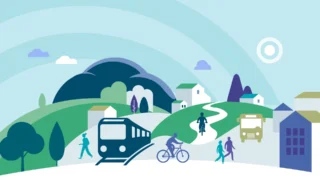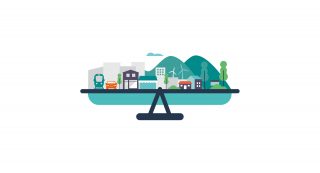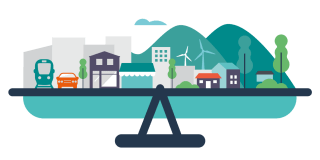The transition to a low carbon economy is one of many challenges facing the Western Region and Ireland at this point in time. Minister for Rural and Community Development, Heather Humphreys TD, today launched the Western Development Commission (WDC) report Making the Transition to a Low Carbon Society in the Western Region— Key issues for rural dwellers which contains new analysis of the challenges for rural areas in the low carbon transition.

The report assesses the scale of the challenge and identifying practical, deliverable recommendations to facilitate the transition. The focus on three key areas: energy efficiency and heat, transport and electricity is timely given the recently published Programme for Government. In that context, the WDC report seeks to inform and advocate for the Western Region in the low carbon transition as part of the social and economic development of the seven counties of Clare, Galway, Mayo, Leitrim, Roscommon, Sligo and Donegal.
The Programme for Government commitment to an average 7% per annum reduction in overall greenhouse gas emissions from 2021 to 2030 is to be underpinned by the core philosophy of a Just Transition ensuring that no sector of society or community is left behind in the movement to a low-carbon future. This is important for rural regions.
This study of what is needed for a transition to a low carbon economy in the rural Western Region is one of eleven pieces of research under Action 160 to “Assess the economic and employment implications of the transition to a low-carbon economy” which fall under the Citizen Engagement, Community Leadership and Just Transition in the Climate Action Plan[1].
The need for climate action is clear and will have diverse and wide-ranging impacts across Ireland, yet there has been very little focus on climate change and emissions issues for people living in rural areas. There are opportunities and challenges ahead and we need to understand the scale and scope of the actions required to reduce rural dwellers emissions and increase the use of renewable energy in rural areas.
Energy Use by Rural Dwellers
Rural dwellers have different energy needs and often have reduced or more costly choices than their urban equivalents. Rural people are thought to have a larger carbon footprint than their urban counterparts and need greater access to cleaner energy choices. At the same time the sources of clean energy for all citizens are largely rural based.
In looking at the three modes of energy use by rural dwellers the study brings together available data to give us a better understanding of where we are starting from and the issues to be addressed to reduce emissions, and some of the opportunities this may bring. It considers the issues from a Western Region perspective but, as the region is predominantly rural, the findings and the analysis are relevant to other Irish rural areas.
Energy Efficiency and Heat
Detached houses account for 64% of all homes in the western region, significantly higher than the national average, and while around a third of the region’s housing units were built between 2001 and 2010, many date back considerably further. This gives some sense of the scale of the retrofit challenge. The report’s recommendation to include various retrofit and finance options means that rural dwellers in older homes, or those of lower value, will still see merit in incremental improvements.
Energy efficiency is important and the ambition in the Climate Action Plan and Programme for Government to upgrade at least 500,000 homes to a BER rating of at least B2 is very welcome. With only 5% of Western Region homes achieving a BER rating of B2 and higher it means that almost 267,000 homes would need to be retrofitted.
The focus of energy efficiency retrofitting is likely to be on homes built before 2011. In the Western Region 93% of homes (280,949) were built before 2011. These are likely to require some form of energy efficiency upgrades and fuel switching to complete a move to a low carbon economy.
In addition to energy efficiency retrofits the heating systems in buildings heated using the most carbon intensive fuels (oil, coal and peat) will need to be changed. In the Western Region more than 82% of homes use oil, coal or peat for central heating, compared with 44% of homes in the rest of the state. Clearly homes in Western Region counties need to be prioritised in the switch to low carbon heating.
Transport
There are more than half a million people living in the rural Western Region. People living in rural areas tend to be at a greater distance from services than their urban counterparts and so the journeys made tend to be longer and more car based. Greater distance to employment and services reduces options for travel and lack of public transport and the distance to public transport services, increases reliance on car travel in rural areas. This creates challenges but also opportunities for compact development, remote working from home or the in the AEC and national hub network.
Electricity Use and Generation.
More than half (55%) of the generation capacity in the Western Region is renewable and the Western Region is currently producing enough renewable electricity to meet 120% of its own demand. The Region is a net provider of renewable electricity to the rest of Ireland making a significant contribution to the 2020 RES-E targets and to the target of 70% renewable electricity generation by 2030.
This is likely to grow in the transition to a low carbon economy. Community engagement and support for this increased generation is vital, and the Renewable Energy Support Scheme, which will enable communities to generate both energy and revenue, offers huge potential for rural areas.
Conclusions
As the Western Region[2] is largely rural, the work of the Western Development Commission (WDC) has a particular focus on the needs of and opportunities for more rural and peripheral areas. Energy and climate action will bring important opportunities to our largely rural region, but at the same time it will bring challenges that need to be addressed for the region to make the transition.
Taking action to address rural dwellers emissions brings with it the potential for significant benefits in terms of warmer homes, cleaner air, and more sustainable use of our abundant natural resources. But it will be a major challenge and will require significant changes in the way we live, work and do business.
The Western Development Commission is committed to working with communities, with both public and private stakeholders, as part of its ‘Work Smarter, Live Better’ strategy to facilitate the transition to a sustainable, low carbon economy and a brighter future for all.
Helen McHenry
The views expressed here are those of the author and do not necessarily represent or reflect the views of the WDC
Sources
- [1] https://www.dccae.gov.ie/en-ie/climate-action/topics/climate-action-plan/Pages/climate-action.aspx
- [2] There are seven counties in the Western Region under the WDC remit: Donegal, Sligo, Leitrim, Roscommon, Mayo, Galway and Clare.





